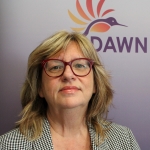Legal Advocacy to End Discrimination Against Women with Disabilities
Presented by: Bonnie Brayton, Kerri Joffe & Rosel Kim.
This Webinar was presented and recorded on August 17, 2021.
This Webinar brought together representatives from DisAbled Women’s Network of Canada (DAWN Canada), ARCH Disability Law Centre, and Women's Legal Education and Action Fund (LEAF) to discuss their ongoing legal advocacy regarding gender-based violence against women with disabilities.
Presenters shared the various faces of gender-based violence for women and girls with disabilities and spoke about efforts to include intersectional feminist lenses in legal advocacy addressing discrimination against women with disabilities. Examples from litigation, public legal education, community development, and law reform will be provided. Presenters also discussed lessons learned from legal interventions, including the ableist assumptions in the justice system, the importance (and limits) of terminology, and the need for judicial education.
Webinar Recording
Webinar Recording with ASL Interpretation
Learning Objectives
Participants:- Learned about gender-based violence against women and girls with disabilities.
- Developed their understanding of how ableism and stereotypes impact the legal experiences of women with disabilities.
- Found out how the legal system can support women with disabilities move from victims to survivors.
- Reflected on how they can center the needs and voices of people living with disabilities in their work.
Speaker Biographies

A recognized leader in both the feminist and disability movements, Bonnie Brayton has been the National Executive Director of the DisAbled Women’s Network (DAWN) Canada since May 2007. In this role, she has proven herself as a formidable advocate for women with disabilities here in Canada and internationally. During her tenure with DAWN Canada, Ms. Brayton has worked diligently to highlight key issues that impact the lives of women and girls with disabilities.
From 2016 to 2019, Ms. Brayton served as a member of Minister’s Advisory Council on Gender-Based Violence(WAGE) and was reappointed to a two-year term. Earlier in 2020, Bonnie was appointed by The Honourable Carla Qualtrough to Covid-19 Disability Advisory Group (CDAG) and will continue to serve as part of the DAG. Bonnie was also appointed to be part of Gender and Trade Advisory Group.
Ms. Brayton lives in Montreal with her partner Delmar Medford. She has two adult daughters, Leah and Virginia.
 Kerri Joffe is a human rights lawyer at ARCH Disability Law Centre. She has been involved in disability rights litigation at various tribunals and courts, including the Supreme Court of Canada. Kerri has presented law reform and policy submissions about disability law issues to legislative committees, governments, administrative bodies, and the United Nations Committee on the Rights of Persons with Disabilities. She has delivered extensive public legal education to diverse disability communities and has guest lectured on disability rights issues. Before joining ARCH, Kerri worked on housing rights, social assistance programs, immigration, and refugee issues, human trafficking, and as a law clerk to Superior Court judges. Kerri holds degrees in law and social work from McGill University.
Kerri Joffe is a human rights lawyer at ARCH Disability Law Centre. She has been involved in disability rights litigation at various tribunals and courts, including the Supreme Court of Canada. Kerri has presented law reform and policy submissions about disability law issues to legislative committees, governments, administrative bodies, and the United Nations Committee on the Rights of Persons with Disabilities. She has delivered extensive public legal education to diverse disability communities and has guest lectured on disability rights issues. Before joining ARCH, Kerri worked on housing rights, social assistance programs, immigration, and refugee issues, human trafficking, and as a law clerk to Superior Court judges. Kerri holds degrees in law and social work from McGill University.
 Rosel Kim is a staff lawyer at the Women’s Legal Education and Action Fund (LEAF), who lives and works in Tkaronto. As a staff lawyer at LEAF, she contributes to the development and management of LEAF’s cases and drafts LEAF’s law reform submissions. She has written about technology-facilitated gender-based violence, race, and identity for the Toronto Star, CBA National, and Puritan Magazine, among others. Rosel is a frequent speaker on gender equality issues. She serves on the Board of the Korean Legal Clinic, which aims to improve access to justice for Korean Canadians by providing culturally and linguistically appropriate legal services, education, and resources with partner organizations.
Rosel Kim is a staff lawyer at the Women’s Legal Education and Action Fund (LEAF), who lives and works in Tkaronto. As a staff lawyer at LEAF, she contributes to the development and management of LEAF’s cases and drafts LEAF’s law reform submissions. She has written about technology-facilitated gender-based violence, race, and identity for the Toronto Star, CBA National, and Puritan Magazine, among others. Rosel is a frequent speaker on gender equality issues. She serves on the Board of the Korean Legal Clinic, which aims to improve access to justice for Korean Canadians by providing culturally and linguistically appropriate legal services, education, and resources with partner organizations.





